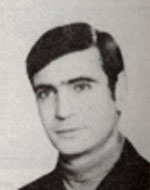Ben-Atar, Eliyahu
Eliahu, son of Yakut and Yehuda, was born in 1944 in Fez, Morocco, and immigrated to Israel with his family in 1960. He was a member of a family of rabbis and a descendant of the holy rabbi, Or HaChaim, Rabbeinu Chaim son of Attar, who is buried on the Mount of Olives. Elijah’s childhood was spent in Morocco where he completed his studies at the Alliance elementary school. He spent his free time hiking in the countryside, enjoying every creature and plant that came his way, and even as a child he studied the names of most animals and plants and insisted on their qualities. He learned his first knowledge of the Land of Israel from the Torah scroll and the chapters of Judaism he had learned in Morocco. But his attitude toward the Jewish state was shaped by his brothers, who immigrated to Eretz Israel in the framework of the Youth Aliyah and came to visit Morocco. The stories about the State of Israel and about the lives of the Jews in a free country of their own stirred his imagination, and his aspiration to immigrate to Israel grew from day to day. Eliyahu and his family left Morocco in 1960, illegally, with all the dangers involved. In Israel, the son of-Atar family encountered difficulties in receiving absorption and Eliyahu was forced to work to help support the family. Eliahu was drafted into the Israel Defense Forces in November 1962. He was discharged from the regular army six months after his enlistment to help support the family and was assigned to a reserve unit of the infantry brigade in the Jerusalem Brigade. Jerusalem After the Six-Day War, Eliahu began working in the mail, and in 1971 he married his girlfriend Fanny Kasos, who moved to the Kiryat-Yovel settlement in Jerusalem and despite the harsh conditions in the area, Eliahu and Fanny managed to make their home a warm home. It was then expressed, and he cultivated the modest house and became a sign To a corner filled with plants and flowers, and his first son Aryeh was born shortly after his marriage to his wife and child, and he continued to maintain close ties with his family and was ready to help her with any problem that arose in March 1973, Elijah’s father died, and he began to visit the synagogue regularly, which he had not done before, and began to rediscover the Jewish religion and the tradition of his forefathers. Eliahu and his comrades served at the time in the strongholds on the banks of the Suez Canal, and were the first to stop the attacks by the Egyptian army, which crossed the Suez Canal. On the 8th of Tishrei 5734 (October 8, 1973), Eliahu was hit and killed in the fighting in the Kantara area. He was brought to eternal rest in the cemetery on Mount Herzl. He left behind a wife and a son, a Aryeh, a mother, brothers and sisters. His daughter, who was born after they fell, while he was missing, is called Natalie. In a letter of condolence to the bereaved family, the commander of the unit wrote: “Elijah was among our ranks, fought bravely in the stronghold of Milano, on the Suez Canal, and fell in defense of his comrades and his home in the rear. Soul and a great deal of self-risk until it falls. During his service with us in the battalion, we found the qualities of a man and a model warrior, and we, the commanders of the unit and its soldiers, are in pain together with you. His character will remain with us forever. “
